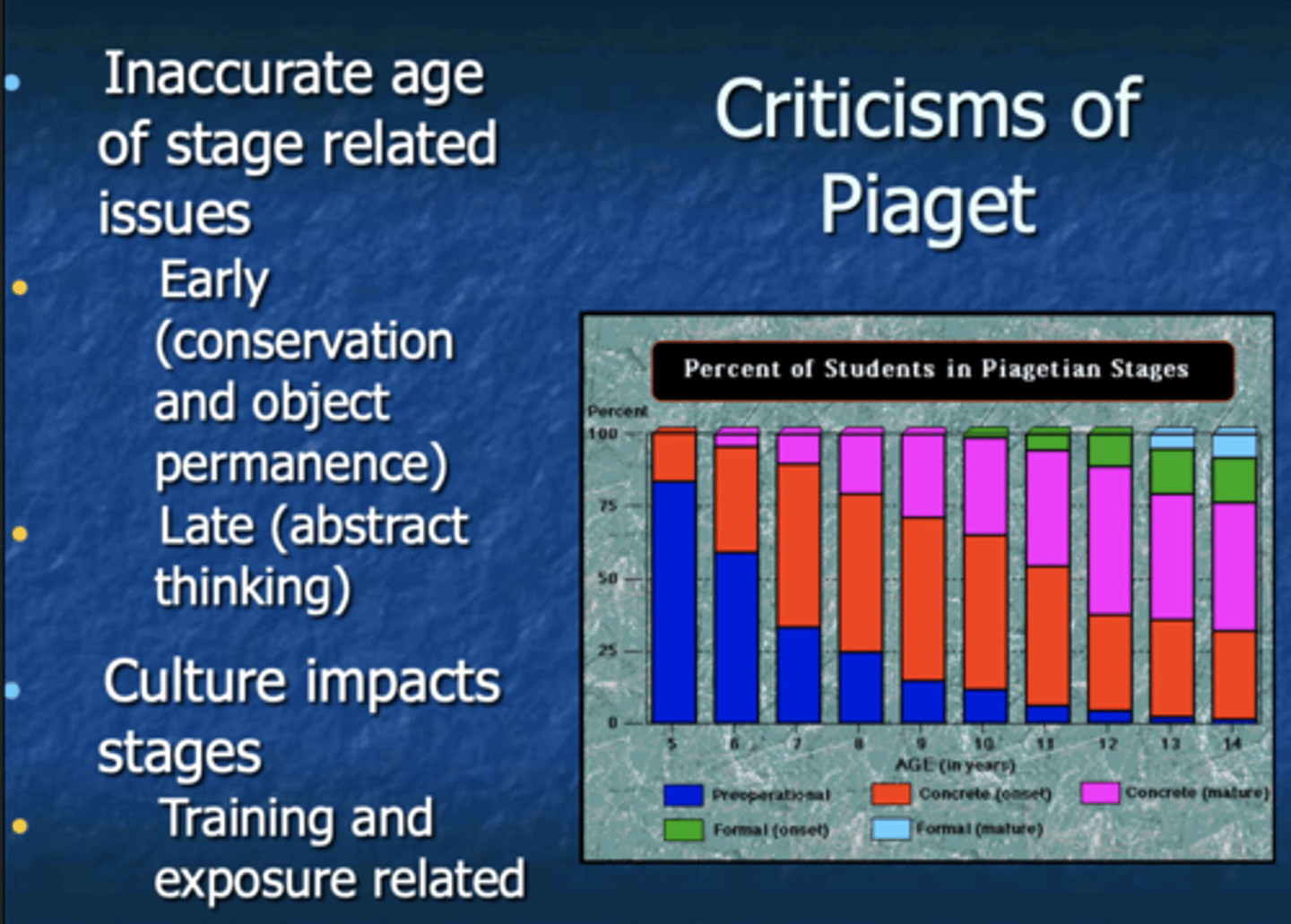Psychology 1 Gade Midterm 2
1/160
There's no tags or description
Looks like no tags are added yet.
Name | Mastery | Learn | Test | Matching | Spaced |
|---|
No study sessions yet.
161 Terms
The Memory Debate. What are the issues with studying memory?
-Worries about being able to control for individual experience linked differences
-Questions about how to explore the processes involved
-Questions about the accuracy of memories reported
Hermann Ebbinghaus
-tried to prove that we could examine the concept of memory scientifically
-research meant for "normal" people
-focus of his approach was to determine how we can "acquire" and "forget" information
How did Hermann Ebbinghaus control for individual differences?
Used himself as his primary research subject
How did Hermann Ebbinghaus control for stimulus differences?
Used lists of nonsense syllables
Variables that Ebbinghaus altered?
-Number of nonsense syllables in the list
-Length of time that passed before testing himself after "learning" the nonsense syllables
-Number of times reading the nonsense syllables
What was Ebbinghaus able to generate from his lists of nonsense syllables?
-Information about memory capacity (7+-2 items)
-Learning curves
-Forgetting curves
As retention interval increases, the delay causes recall to
Decline
Ebbinghaus' experiments taught us that
-We could scientifically study the topic of memory
-Information on memory capacity and the malleability of our minds
Ebbinghaus's work did not explore
- our ability to display memory of information when we are asked to reproduce it in approach
- different types of memory that potentially exist
- if memory capacity changes for meaningful info
- if and how we alter our memory of information
Herman Ebbinghaus's form of testing is known as
a free recall test
Cued recall tests
-Participants are provided with cues (words or phrases) to aid recall of previously experienced stimuli
-Providing a blank map in order to recite the 50 states
Recognition tests
-A subject is shown stimuli such as words or pictures and, after a retention interval, must indicate from a new test list whether each item is "old" (from the earlier list) or "new" (not shown earlier)
-Multiple choice (identify the right choice when multiple options are given)
-Given a list of adverbs, among the list are the names of the seven dwarves, identify them
Savings tests
-The ability to relearn a certain list of information in less time than it took originally
-Already memorized periodic table but forgotten, but you will be able to re memorize faster than someone who is memorizing for the first time
Implicit memory tests
-Links to testing anterograde amnesia (drawing a star only looking at it through a mirror; even amnesia patients who have lost their memory show improvement with this complex motor task)
-Stimulus/response pairs (classical conditioning)
-Learned motor task example (riding a bike)
How something is remembered?
3 Steps: Encoding, Storage, Retrieval
Encoding
The process of converting information into a form that will allow us to retrieve that information later
Storage
The process of retaining critical information for later use
Retrieval
The process of accessing the stored information that we have encoded in order to use it in a situation
Temporal Memory Stages
External events ->sensory input->sensory memory-> attention to important or novel information (encoding)->short term memory->encoding-> long term memory (can then retrieve to short term memory)

Sensory memory
-considered a hypothetical stage of memory for years
-involves not only vision, but all of our senses
-infinite capacity (George Sperling Research)
- most lasts for a fraction of a second
Sperling's Sensory Memory Experiment
Letters and numbers in rows are flashed on screen for 0.05 seconds. A low, medium or high tone played in next 0.3 seconds and participant says either the first, second or third row accordingly
Short term memory (STM)
-capacity of 7+-2 items
-contains information we think is relevant
-stored from 10 seconds to a few days
-memory is then forgotten or placed in long-term memory
Long Term memory
-important information from STM that we have taken the time to store (important)
-complex but susceptible to distortions and complete fabrications
-debates as to whether or not its ever forgotten
Procedural Memories (Implicit)
-Mental
-Behavioral
Declarative Memories (Explicit)
-Episodic
-Semantic
Serial Order effect
retention of information/items is easier or more difficult due to when it is presented with respect to the other information/items
Primacy effect
the ability to remember information at the beginning more easily
Recency effect
the ability to remember information at the end more easily
Interference effects
information can be lost or less accurate due to an overlap of similar information. fruits and flowers
Proactive interference
New material is lost (not easily stored) due to old material

Retroactive interference
old material is lost (forgotten) due to new material

Reconstruction effect
-although memory can improve when topics are tied together, people tend to include inaccurate information into memories in order to "fill in the gaps" or "fix the errors"
-sometimes people recall things that never occurred (Elizabeth Loftus)
-linked to people altering our memory of our past thinking. (Hindsight Bias)
Elizabeth Loftus
Conducted the "mall study" in which the reconstruction effect led to an alteration of the participants memories as they were led to believe that they were, at one point, lost in a mall as a child even though they never were
Hindsight bias
People's tendency to overestimate their ability to predict an outcome that could not have possibly been predicted, usually after the fact, or after the event has occured
How do we improve our memory? Levels of processing
successful conversion of information from STM to LTM is highly impacted by your approach to make sense of the information
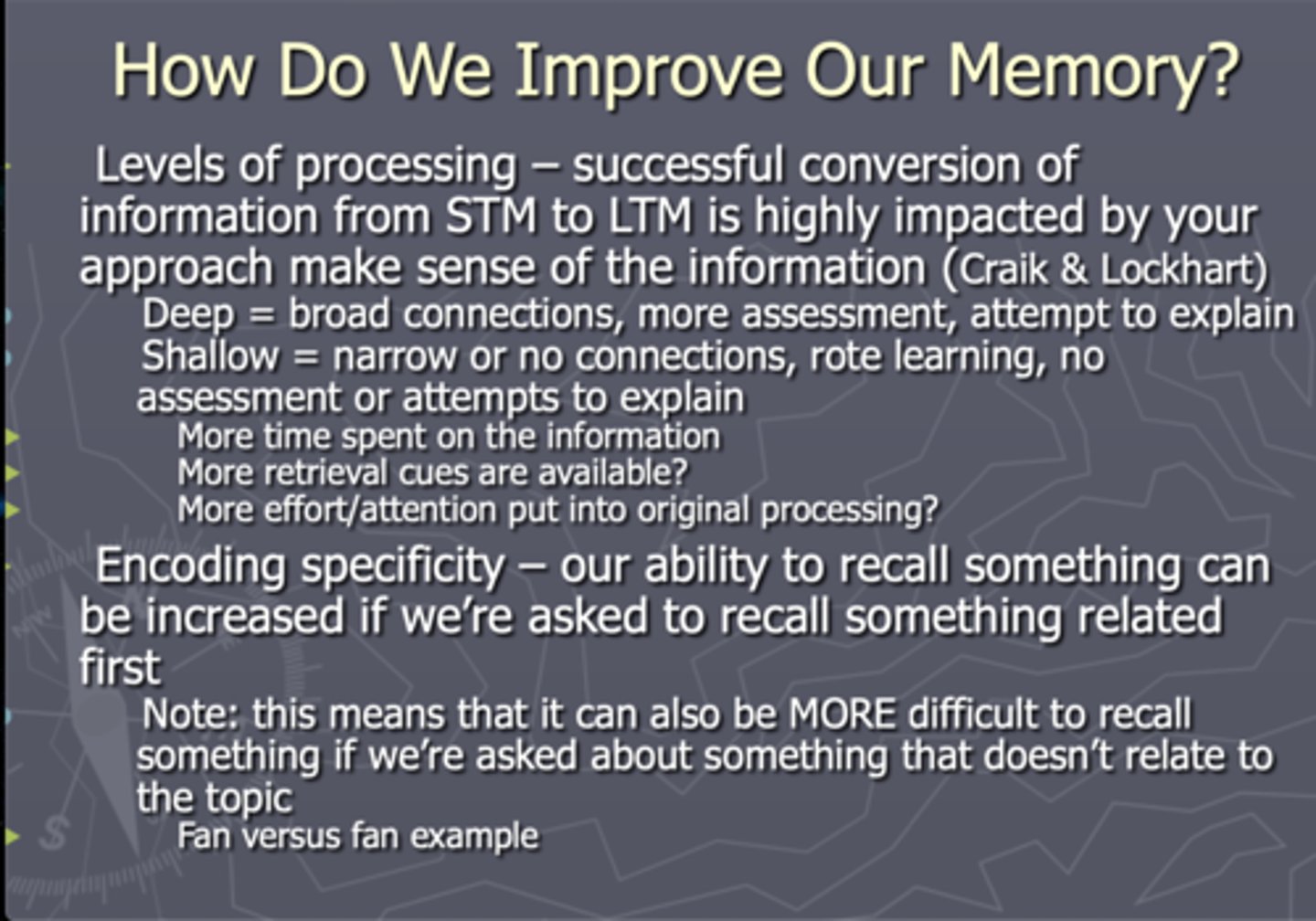
Deep level processing
broad connections, more assessment, attempt to explain
shallow level processing
narrow or no connections, rote learning, no assessment or attempts to explain
encoding specificity
our ability to recall something can be increased if we are asked to recall something related first (vise versa). Fan vs Fan
memory dependence areas
more likely to recall information when in a condition similar to the condition we were in while learning the information in the first place
Language studies
French List->French test is better than french list-> english test
Situation dependency
If you were in a certain location when you learned material you probably will recall material better in that same location
State dependency
If you were chewing gum or doing a certain thing while learning then you will probably recall information better if you're doing the same thing at the time
What classroom specific trick helps with memory?
Increased number of learning sessions (with breaks)
-allows for you to sustain deeper processing efforts
-increase the number of primacy and recency effects
Mnemonic devices
encoding/storage techniques that aid in the process of information retrieval. Acronyms, Chunking, The Method of Loci
Acronyms
mnemonic device that associates the first letter of each word you are trying to remember to letters in a word that's easy to remember
Chunking
a type of mnemonic device that involves grouping by items or concepts
The method of loci
Uses locations of a familiar place (imagined in memory) as a framework for memory retrieval
Intelligence
The ability to solve problems and adapt and learn from the environment
limitations for intelligence?
-interpersonal skills
-memory capacity
-vocabulary usage
-novelty in ideas
Intelligence Types:
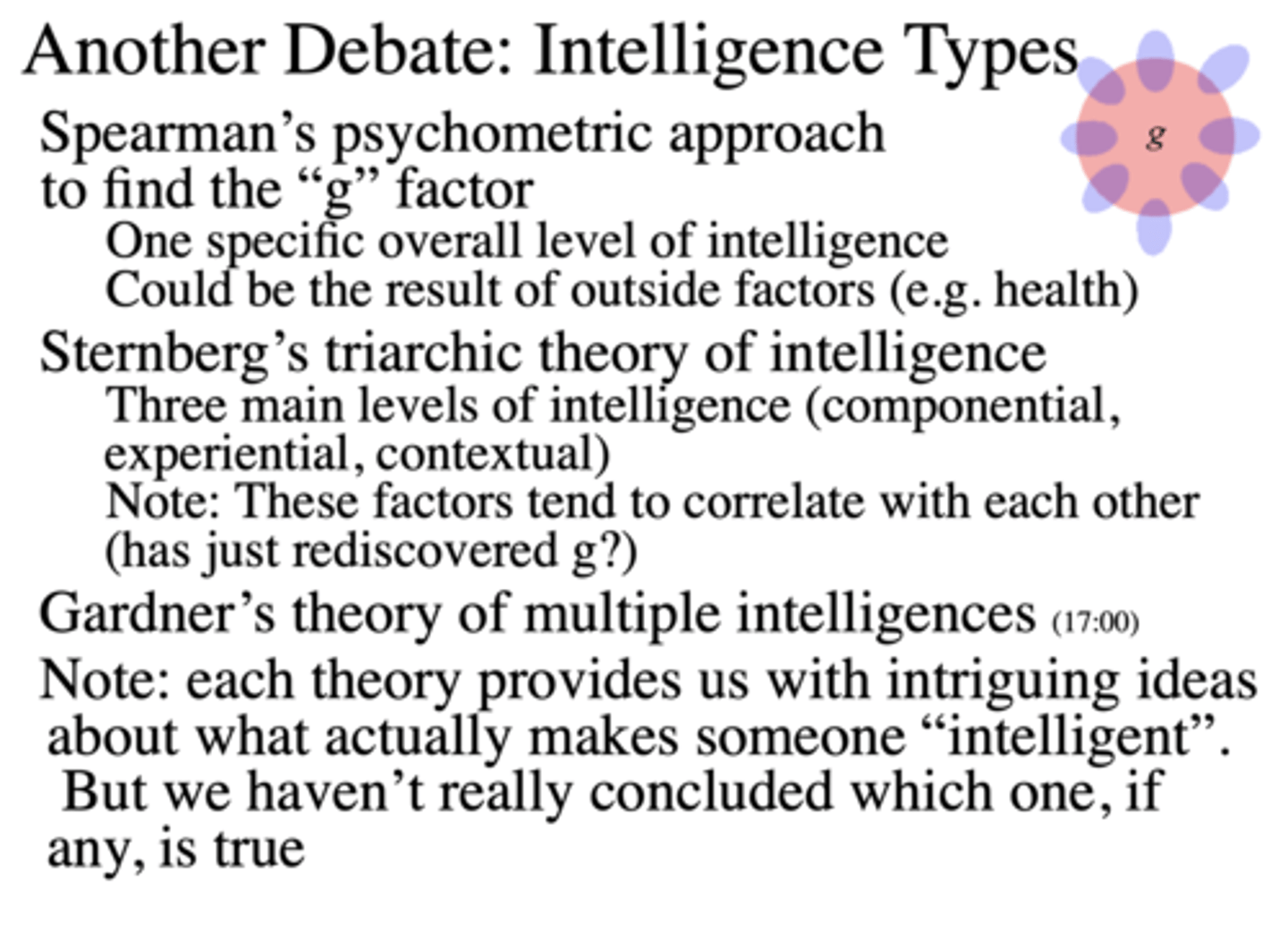
Spearman's psychometric approach
believed there is general intelligence due to outside factors (such as health)
"G" factor
one specific overall level of intelligence identified by spearman. Could result bc of outside factors (health)
Sternberg's triarchic theory
three main levels of intelligence; factors tend to overlap with each other (may have just discovered "g" factor again?)
What are the three components of Sternberg's triarchic theory of intelligence?
Componential, experiential, contextual
Gardner's theory of multiple intelligences
Identified 7 distinct intelligences and individuals differ in the strength of these respective intelligence
Salvoy & Mayer's emotional intelligence (EQ)
the idea that emotional intelligence affects cognitive ability
Fluid intelligence
Intelligence based on the ability to learn across all areas of interest
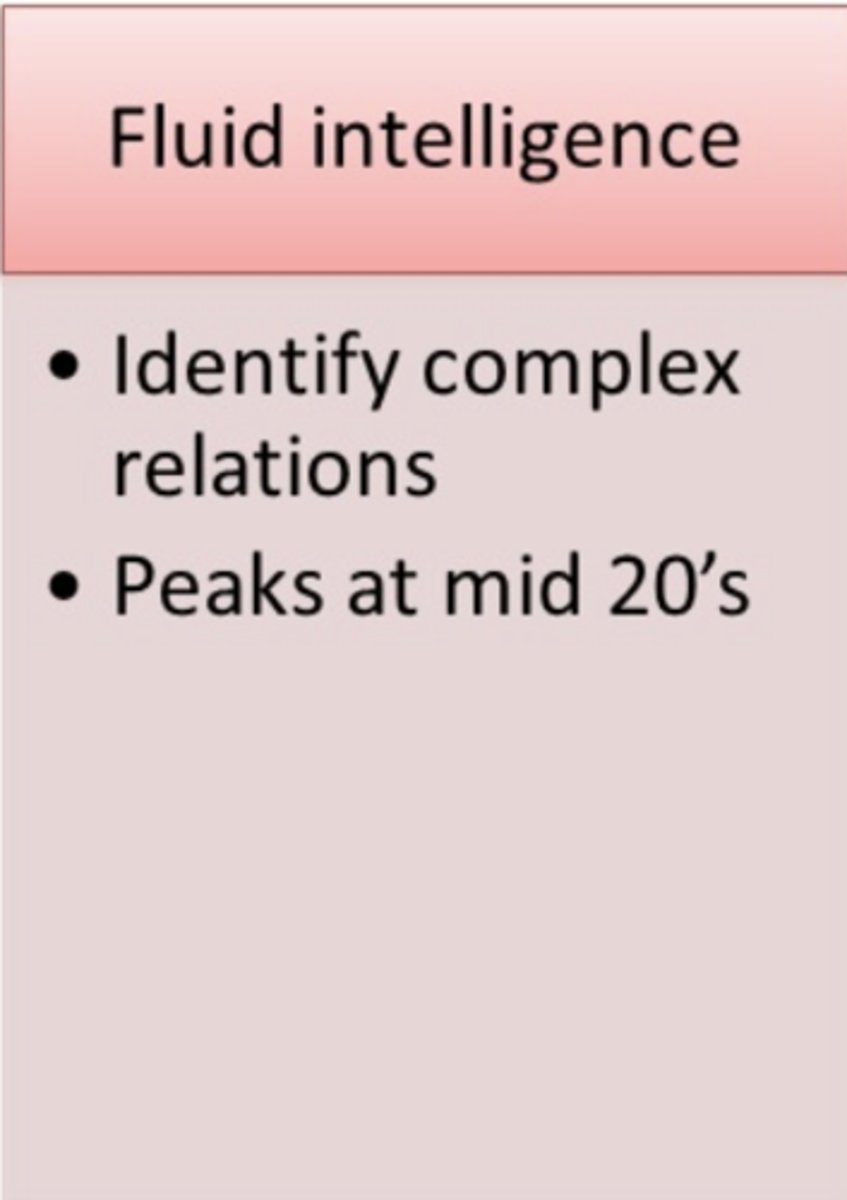
Crystallized Intelligence
Intelligence that is obtained through experience over the lifespan
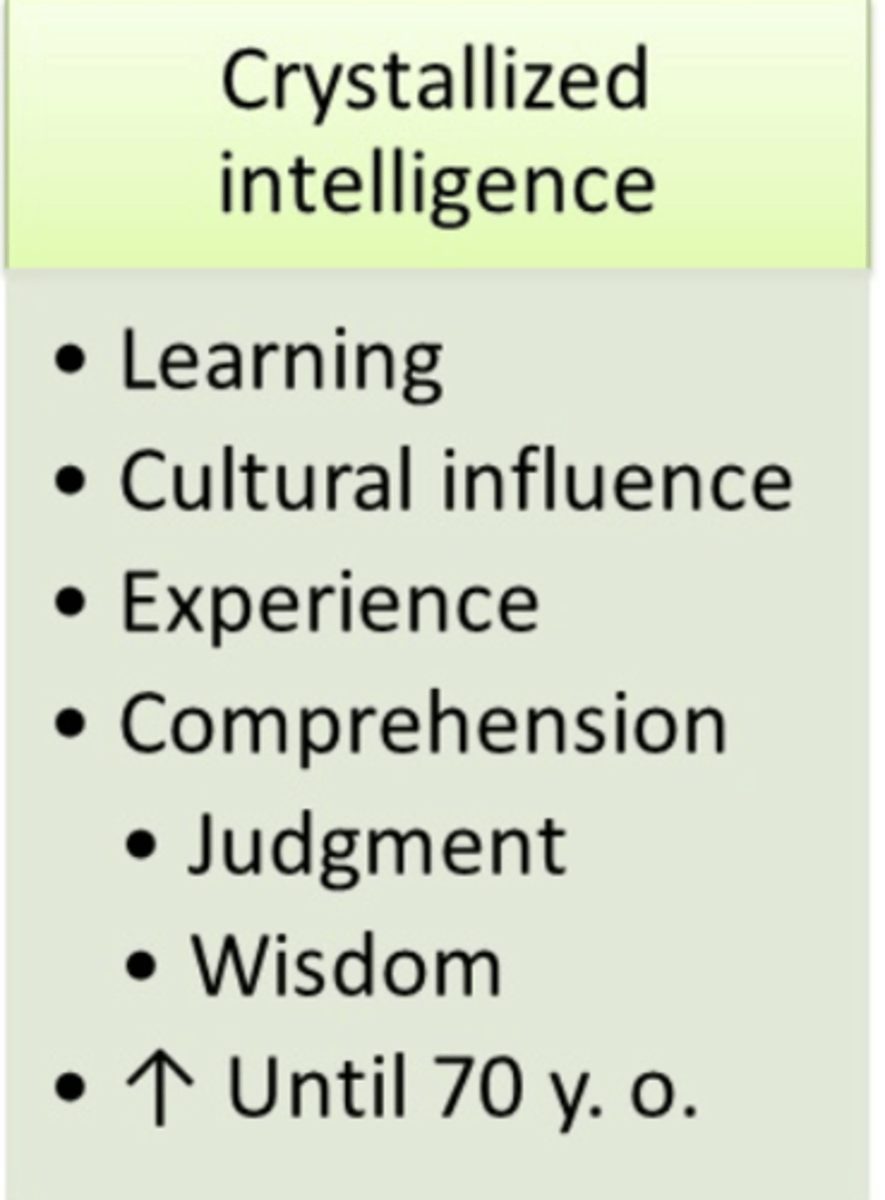
Intelligence tests
Established techniques that allows researchers to compare an individual to their age and culture equivalent peers in order to determine how much more or less "intelligent" he/she is
Alfred Binet
-one of the first psychologists to scientifically explore intelligence
-investigated intelligence in france for children who could not profit from traditional education
- 1904 French Ministry - Helped to find a way children could not profit from traditional education. Binet designed the test with Theodore Simon (student).
Alfred Binet First Intelligence Test tested basic mental skills:
-sentence generation
-naming body parts
-remembering number strings
Scoring the Binet-Simon Test:
- Tested basic mental skills and ultimately hoped to achieve goal by comparing children of different ages in how well they performed both the basic and more complex skills.
- Used 50 "average" children (10 per age group) to set up original scales. Scales revised as samples grew.
- Mental Age (MA) - The age that the child's responses were most indicative of.
- Chronological Age (CA) - Actual age of the child.
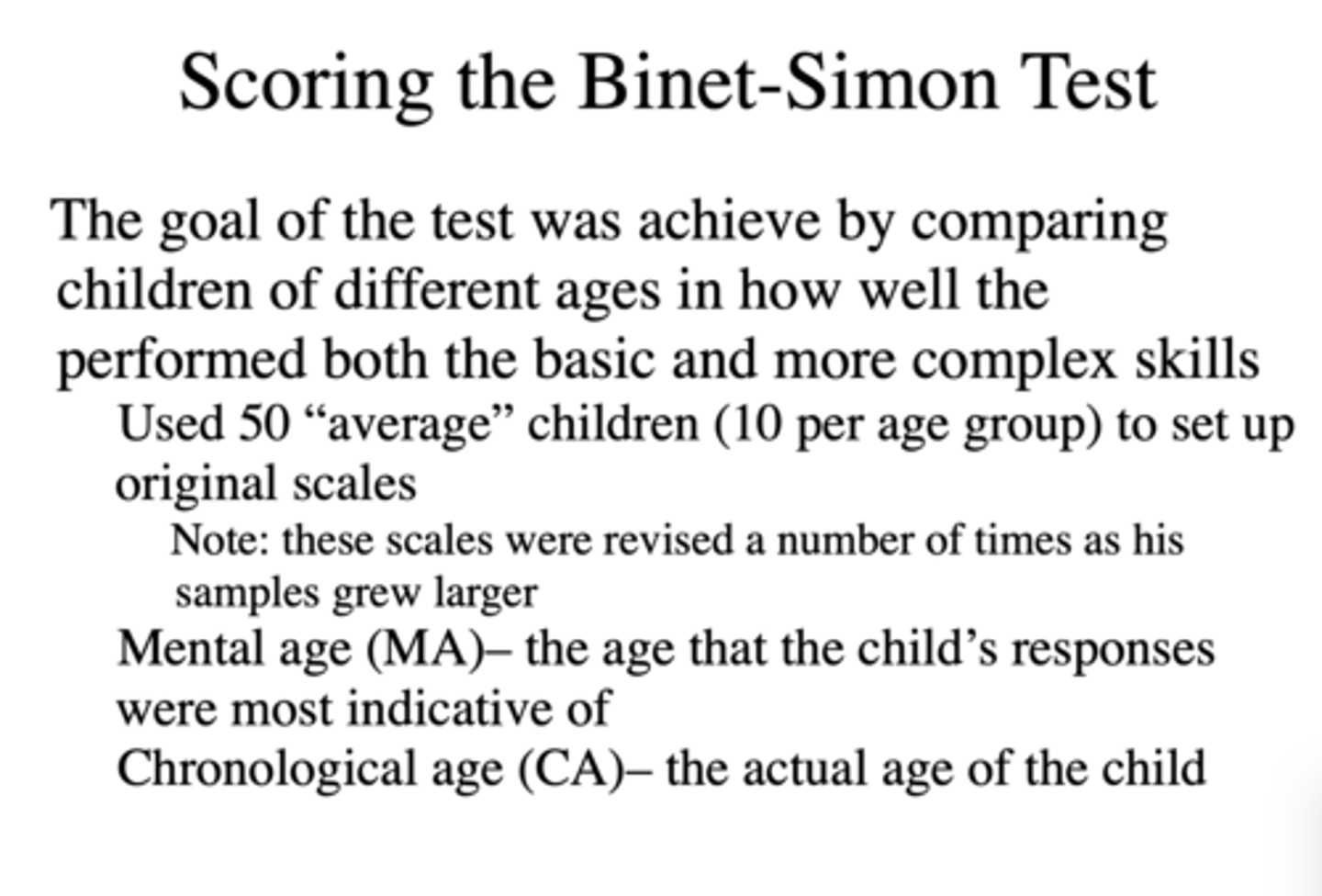
After the Binet-Simon Test..
- application for heritability and eugenics debate.
- aimed to compare adults and focus on average or intelligent.
Stanford-binet IQ test
-Tests designed to measure multiple facets of intelligence across a large range of ages
-designed by Lewis Terman at Stanford
-originally said to measure a person's inborn ability to learn which pushed Eugenics
- Included the Intelligence Quotient (IQ) = MA/CA x 100.
Ingelligence quotient (IQ)
MA/CA x 100
What additional topics did the Stanford-binet test cover?
Fluid reasoning, knowledge, quantitative reasoning, visual-spatial reasoning, and working memory
The Wechsler Scales
-developed by David Wechsler
-standardized the scoring system (average 100 standard deviations 15)
- broke intelligence down into different dimensions
-attempted to minimize cultural and language biasing
- used abundantly in clinical psychology

What two forms did the Wechsler Scales come in?
WAIS: Wechsler Adult intelligence scale (16+)
WISC: Wechsler intelligence scale for children
What Dimensions was the Wechsler scales broke in to?
-Verbal skills
-non-verbal/performance based skills
-general vs. categorial intelligence debate revisited
Progessive Matrices and Other Tests
- New tests that have been invented to counteract the inherent cultural biases that previous intelligence tests possessed
Biases from previous intelligence tests (Not Present in Progressive Matrices)
-Focus on verbal skills and fluency in the language of the test
-Required knowledge of Western culture
Heritability
1. the proportion of a characteristic that can be attributed to the genetic makeup of parents
- Low Heritability = Nurture
- High Heritability = Nature
2. Sibling Studies
- High Heritability in intelligence (Not true when we look at adult intelligence)
- Identical Twins have more similar intelligence then fraternal.
Nature
the amount of a characteristic that can be attributed to our biology (high heritability)
Nurture
the amount of a characteristic that can be attributed to our environment (low heritability)
Predictability and Stability of Intelligence
- Intelligence fluctuates in infants
- Stabilizes once reaching childhood
- IQ's at young age predictive of IQ's through lives. (a note of individual differences)
The Flynn effect
worldwide increases in intelligence over the past few decades. *Note reversal of this effect past few years.
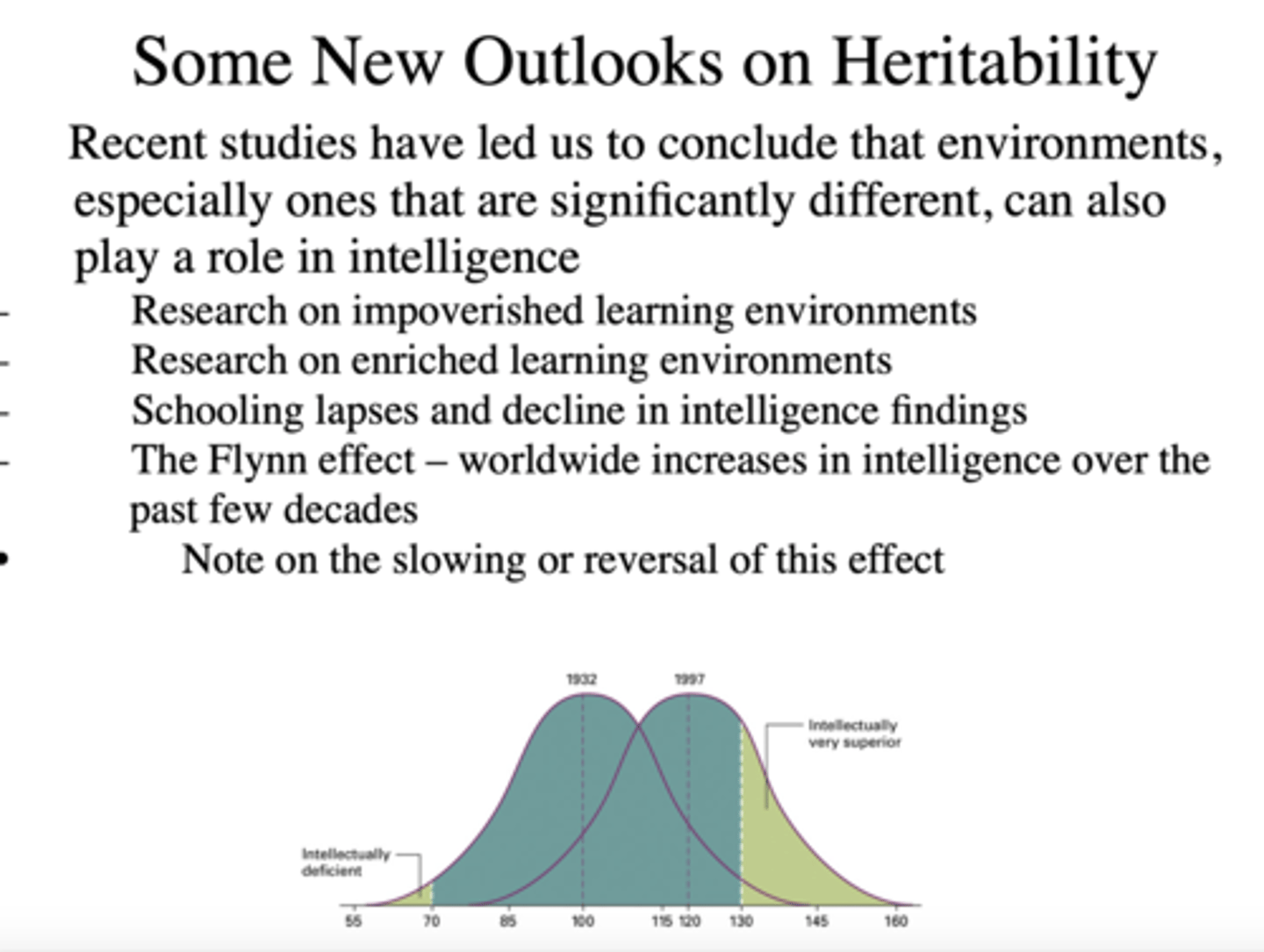
Developmental psychology
- the scientific study of the changes of the mind and related items throughout the changes of the mind and related items throughout the lifespan
- snowflake analogy
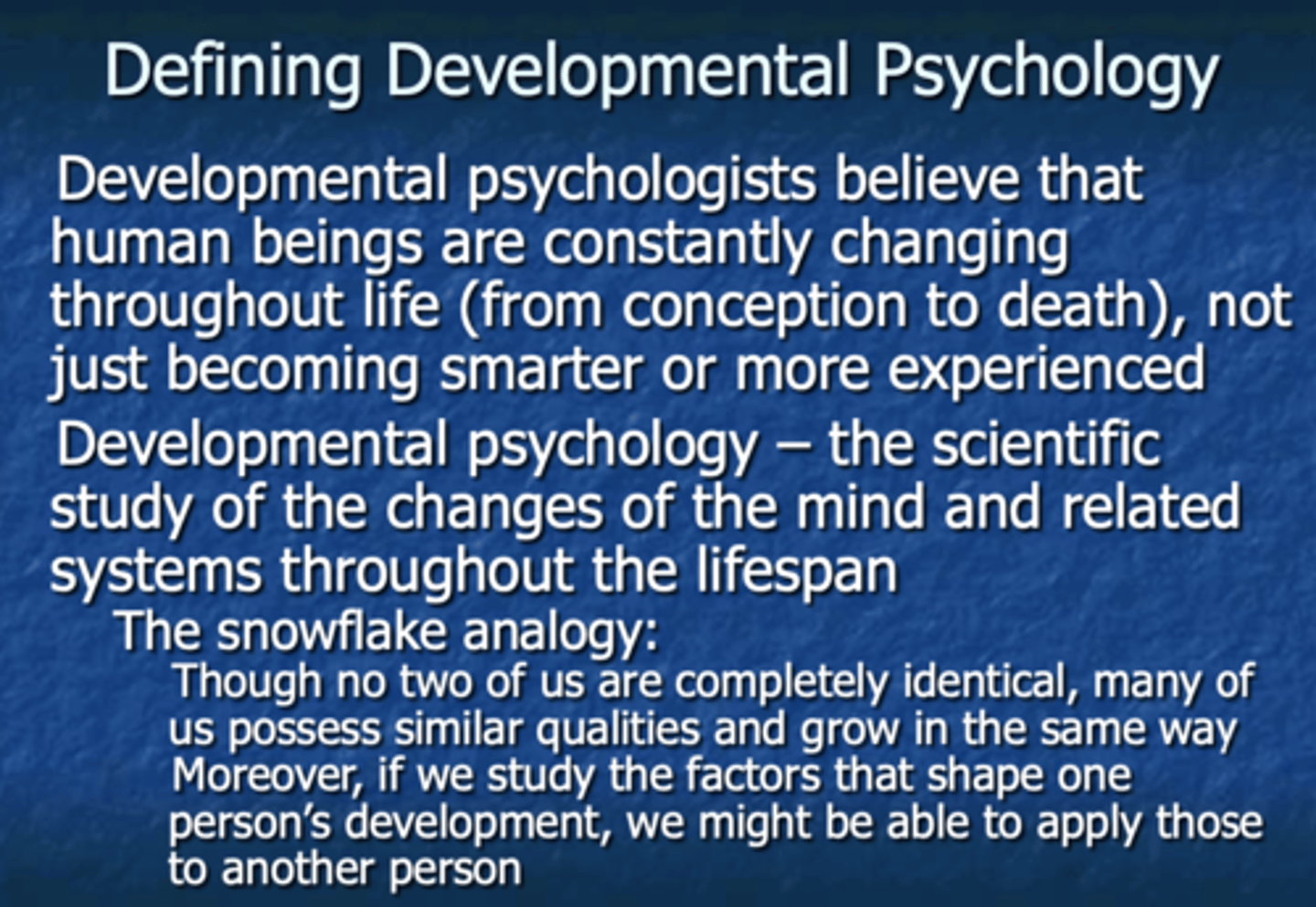
Strategy of Early Developmental Psychologists
- tracking/predicting typical development from conception to death
- understanding the triggers & causes to typical development
- examining non-traditional development in order to understand why it occurred and how it impacts the individual
Birth (developmental psychology)
-Apgar scale
-horrible visual abilities, great hearing, okay taste
-very poor motor and sensory system development (excepting reflexes)
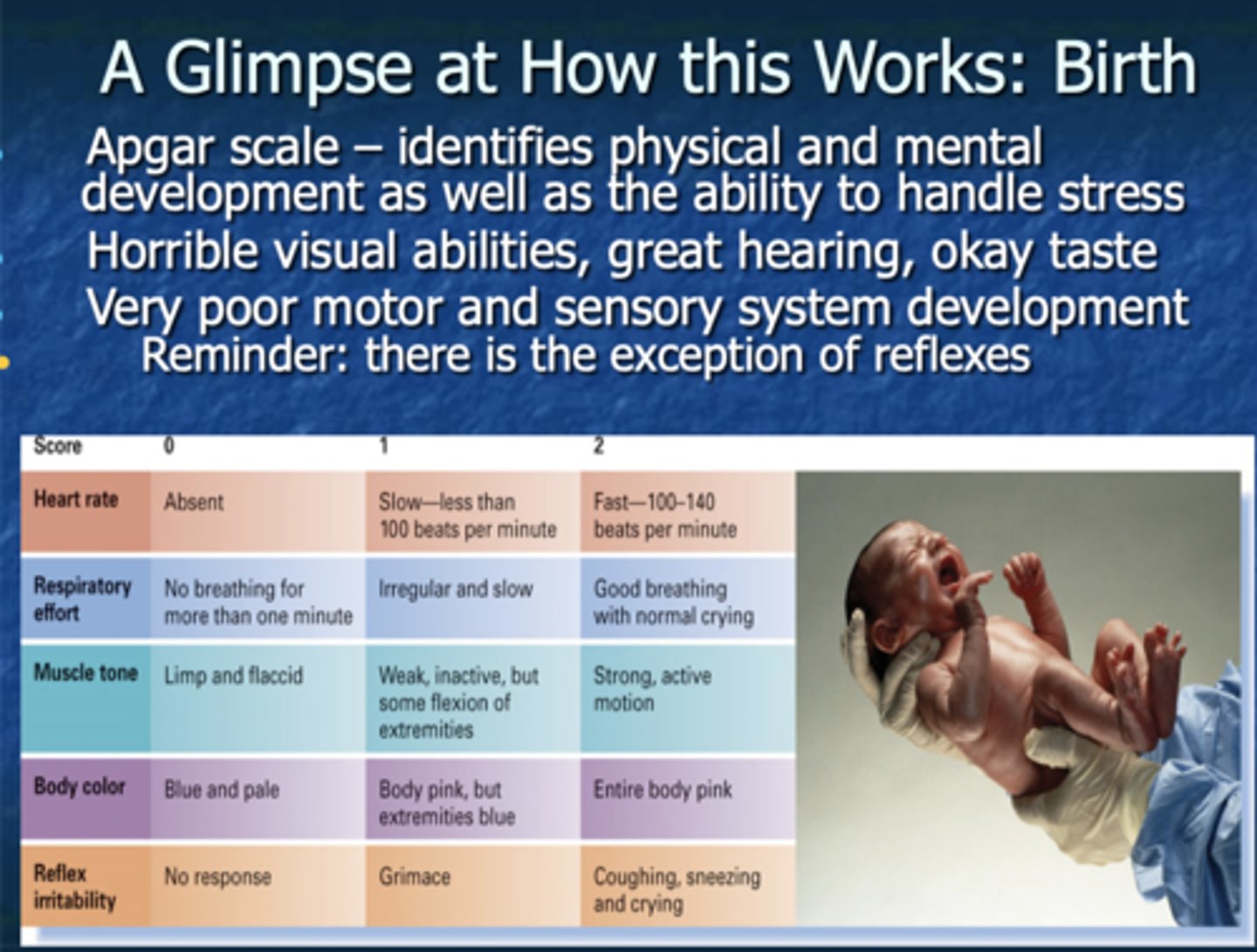
Apgar scale
Identifies physical and mental development as well as the ability to handle stress
Puberty
the process of physical and mental change from childhood to adulthood
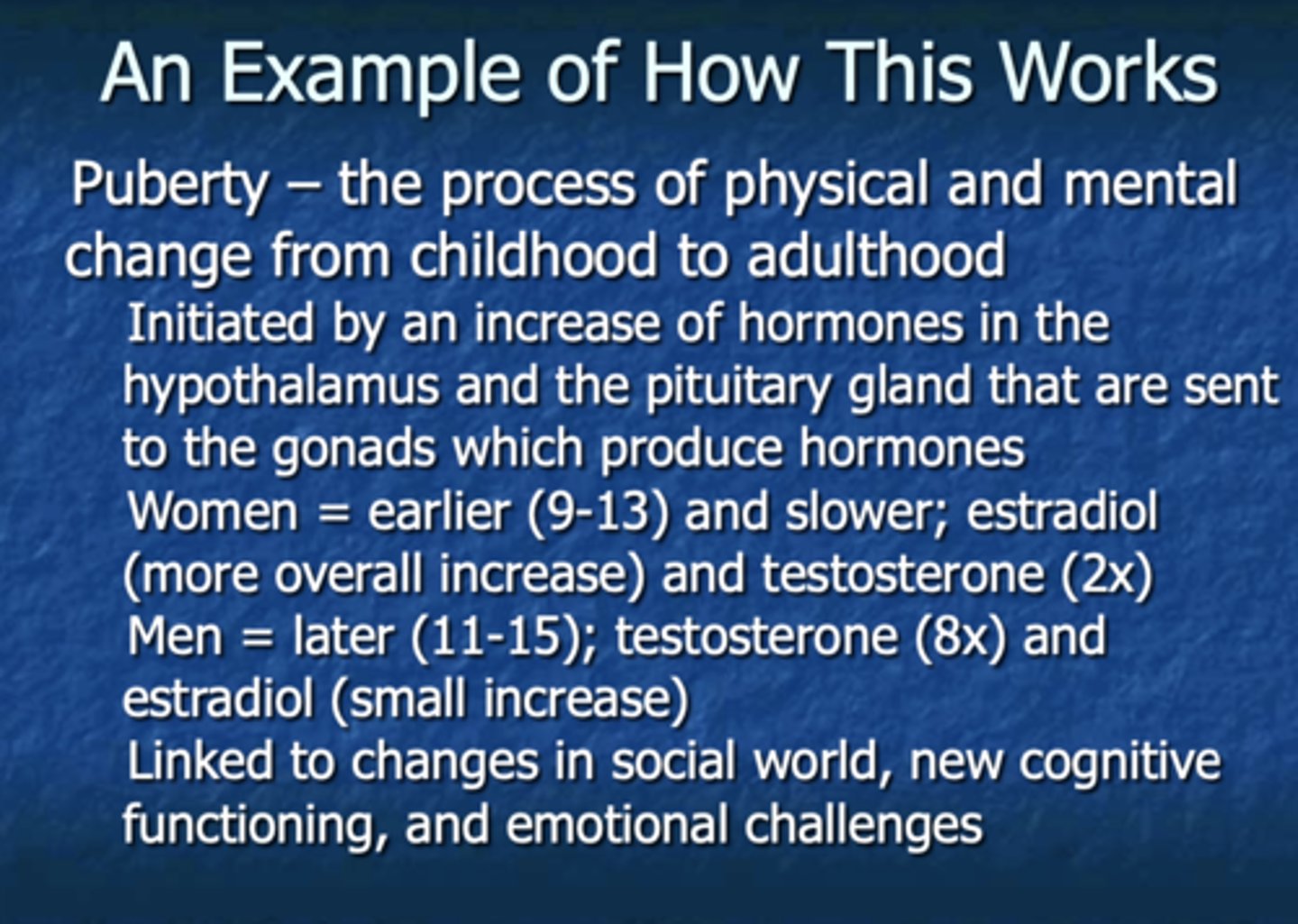
What is puberty initiated by?
An increase of hormones in the hypothalamus and the pituitary gland that are sent to the gonads which produce hormones
Precocious puberty
-the very early onset and rapid progression of puberty
-more often found in girls and has negative impact.
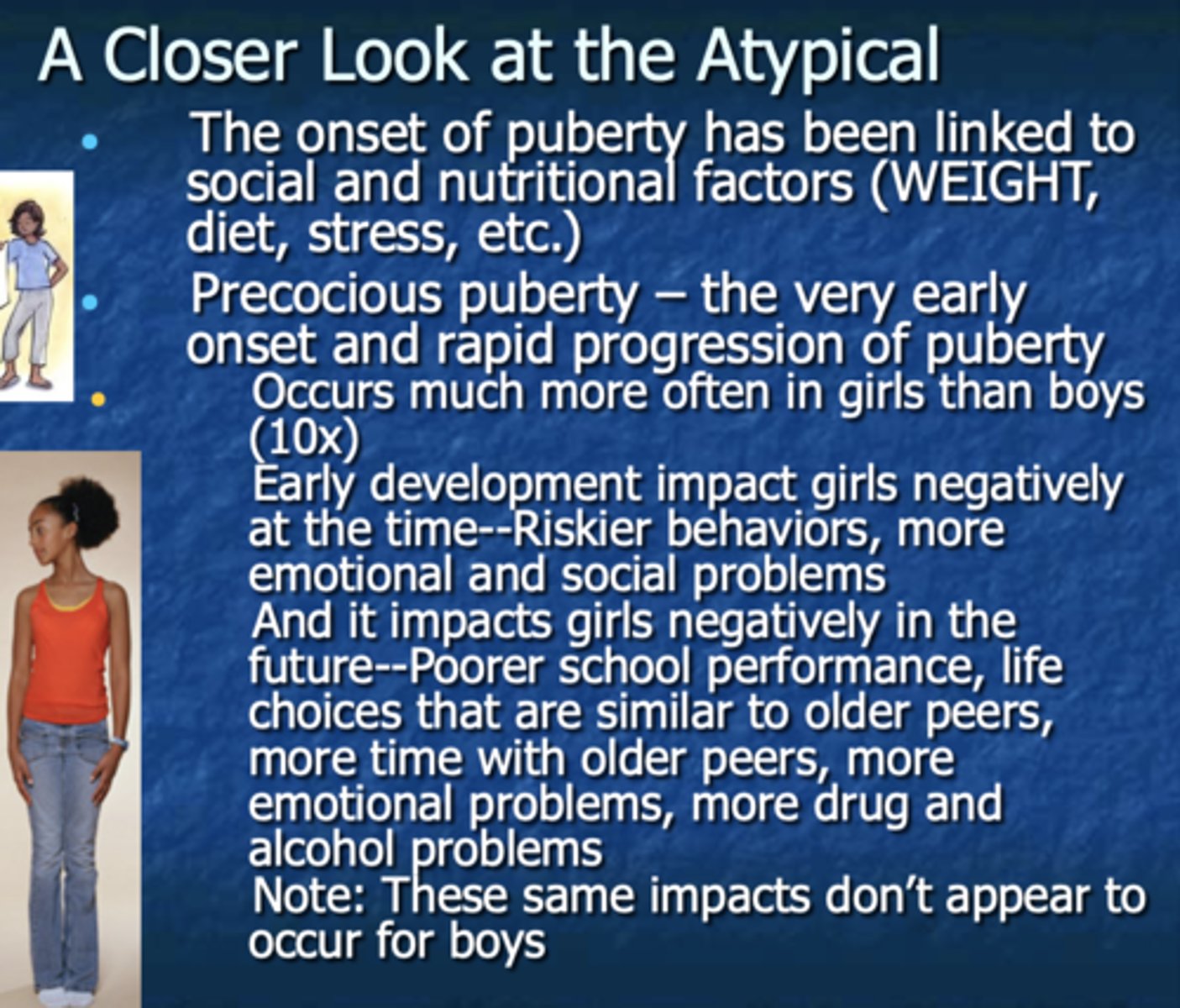
Why do we study Developmental Psychology?
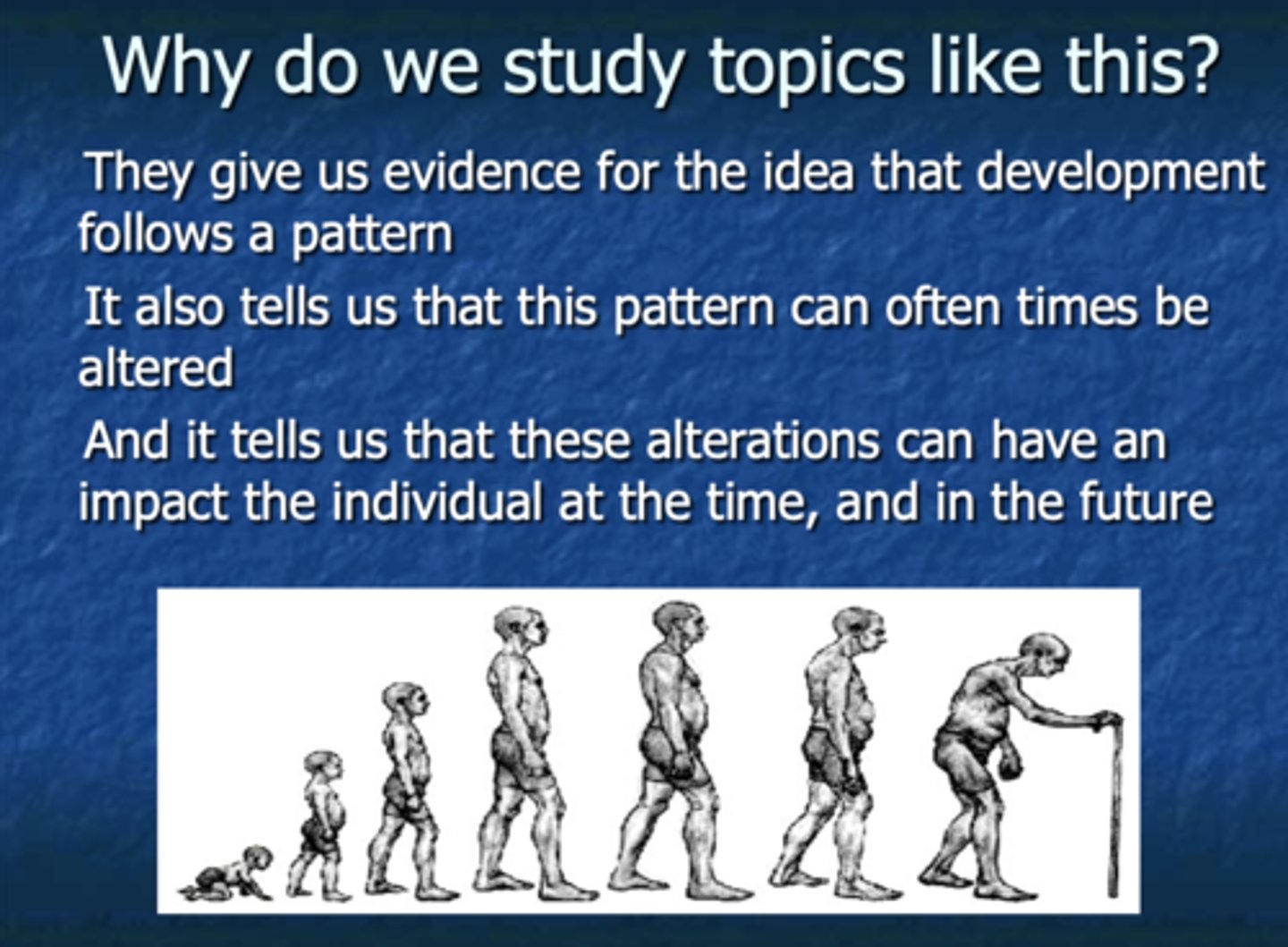
Heritability (Developmental Psychology)
An estimate of the variance within the psychological concept that is due to genetics. Correlation: (high = genetics or nature while low=environment or nurture)
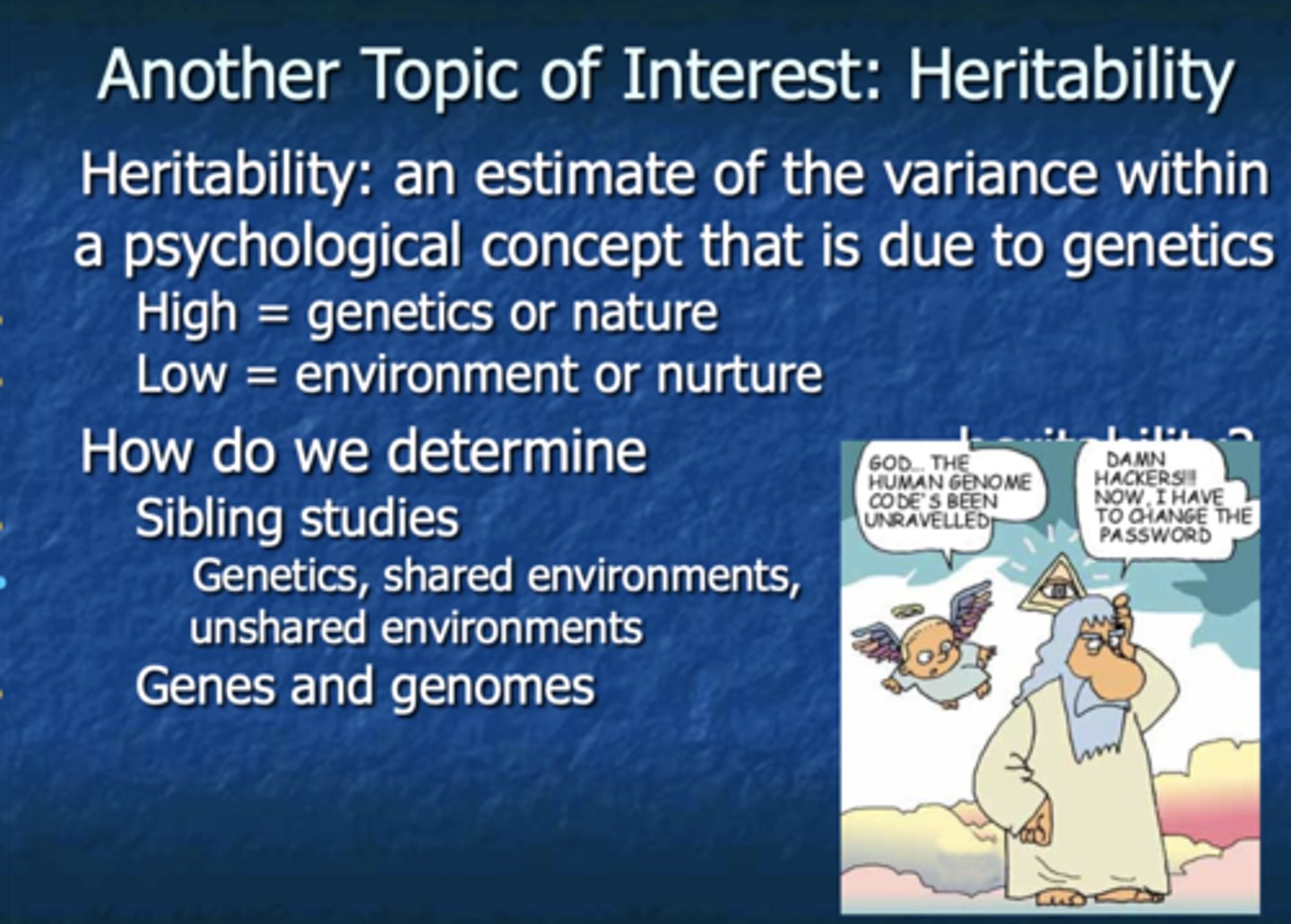
Thomas Bouchard case study (Minnesota Twin Registry)
-Studied identical twins reared apart and noticed significant similarities
-found weird similarities because he asked a lot of weird questions
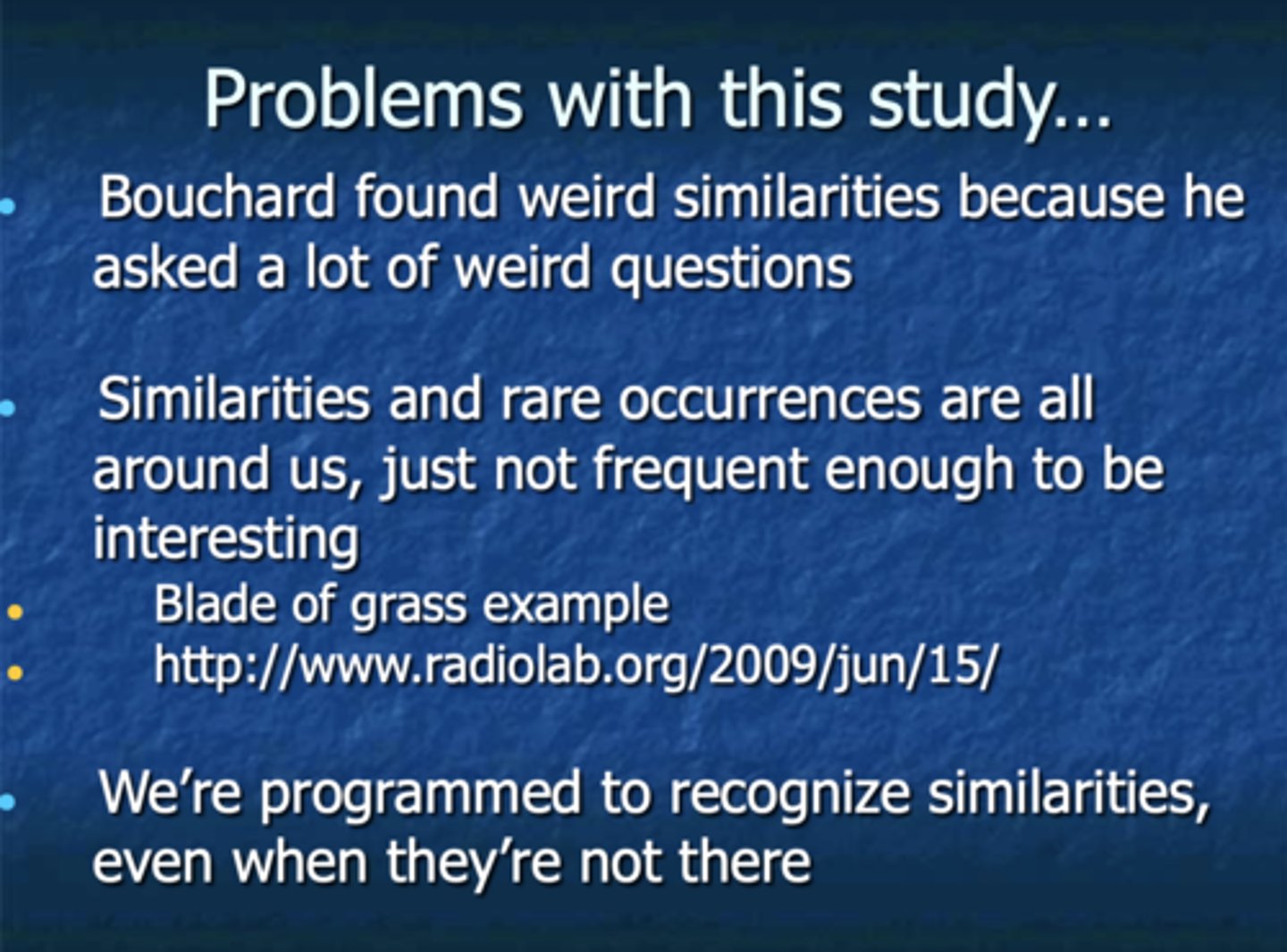
Gerald McClearn at Penn State
Research on Aging in Twins
Correlation Results in Twin Studies
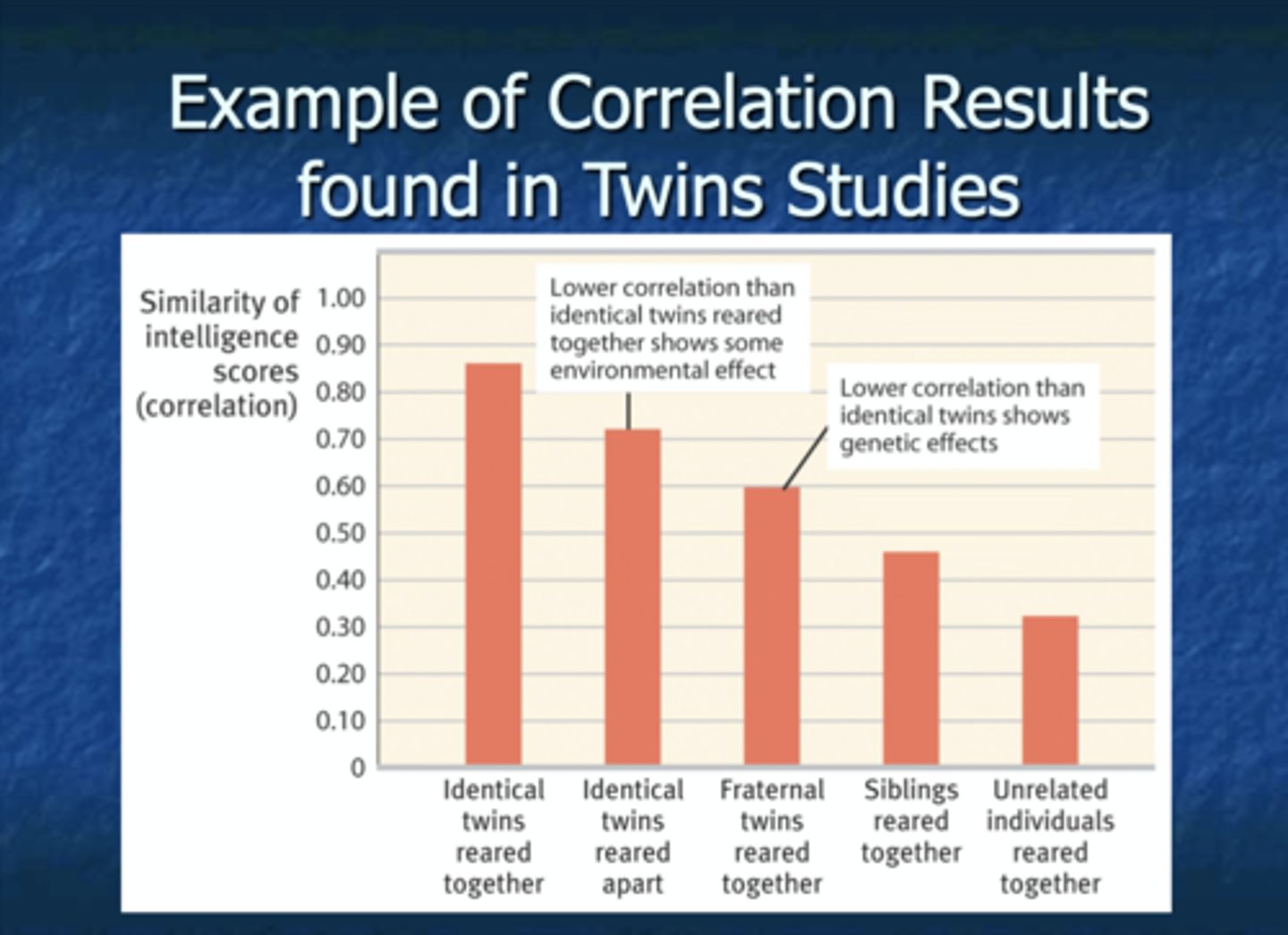
Genes
protein strands within chromosomes; approximate 20,500 genes in average human cell
-determine certain aspects of development through the idea of heritability
- 23 pairs of chromosomes (46 total)
Human genome
the complete set of genes contained within each of us
Jean Piaget (1896-1980)
-leading researcher in cognitive development
-was able to establish terminology as to how "normal" children develop cognitively
- began research by observing his 3 children (assessed Alfred Binet's intelligence tests)
-believed that children are constantly "adapting" to their environment through the demands that are put on them
Piaget's Conclusions
- Schema, Equilibrium, Disequilibrium, Assimilation, Accommodation, Equilibration.
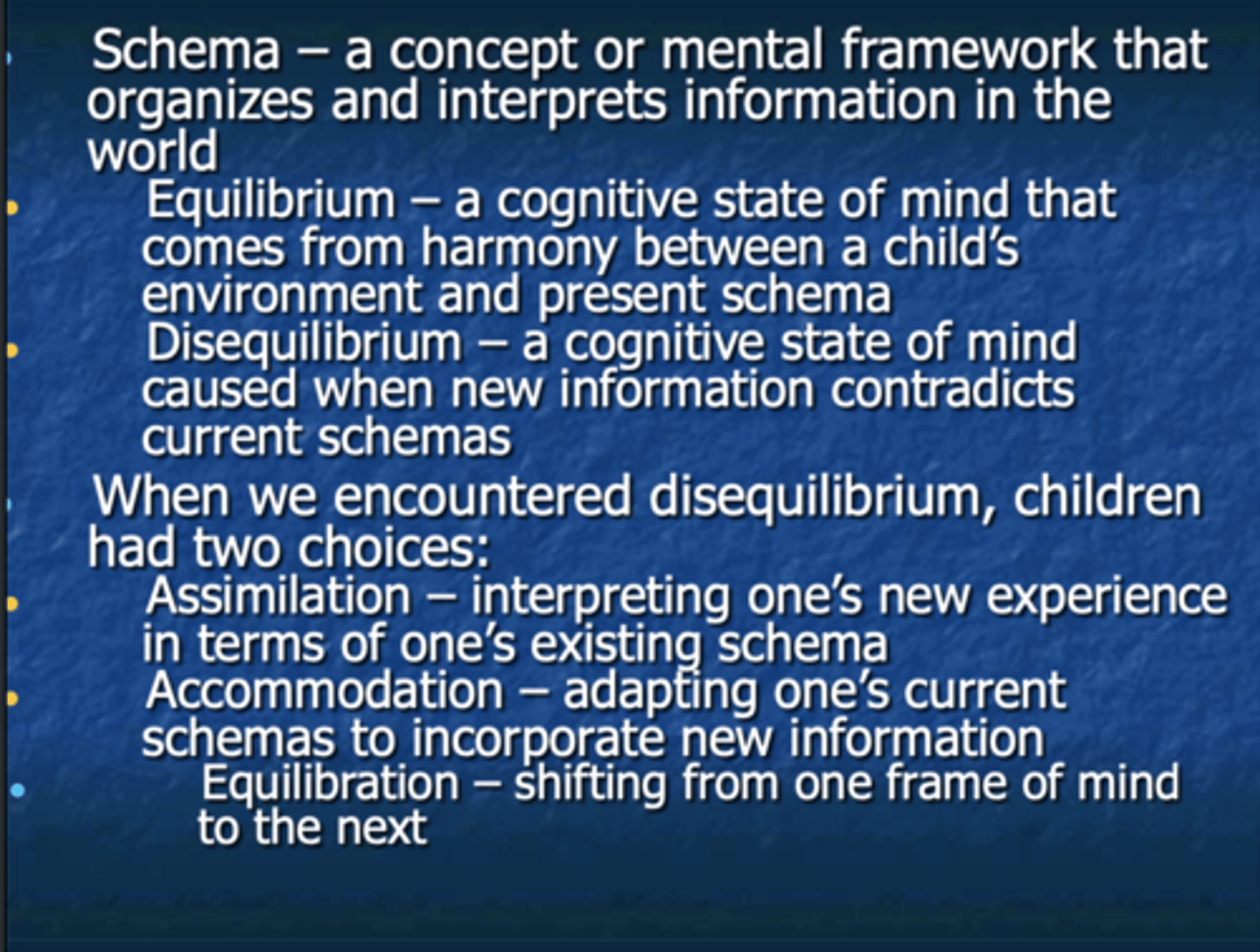
Piaget's Process of Equilibration Conclusion
Schema Conflicts, then they reach a new stage of development.
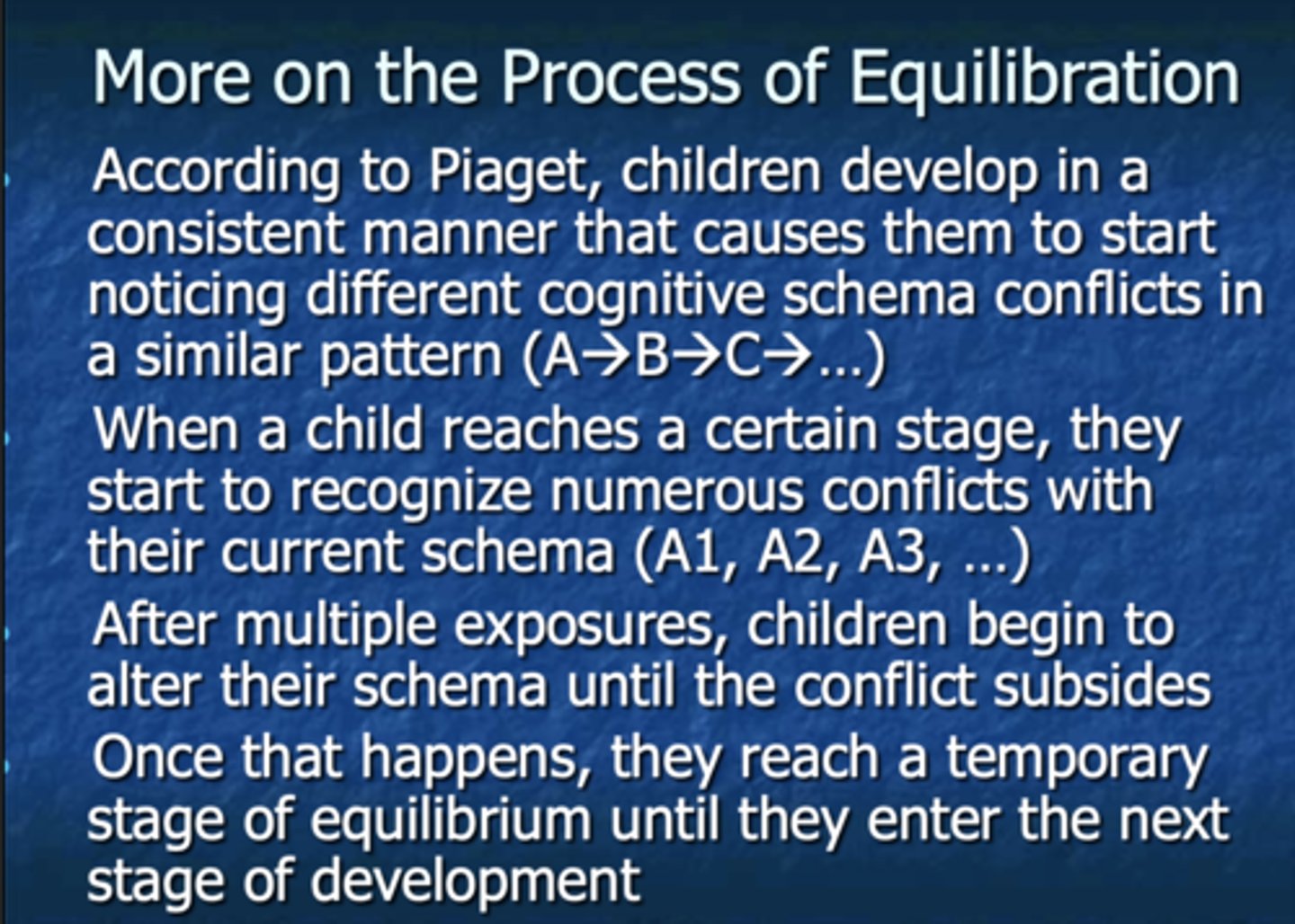
Piaget's Proposed Stages of Cognitive Development
- sensorimotor, preoperational, concrete operational, formal operational
- These stages cannot be sped through adult help and are set.
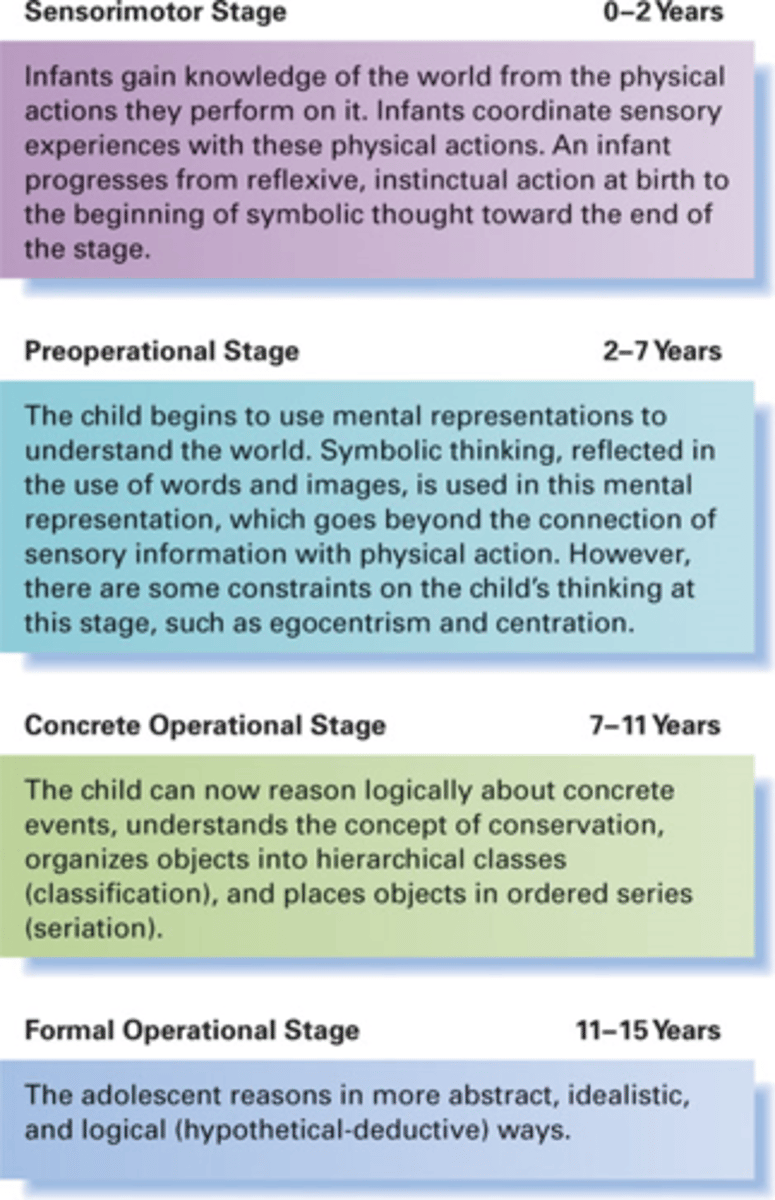
Sensorimotor Stage (0-2 yrs)
-focused on learning different outcomes through the senses and then learning the ways to increase the frequency of desirable outcomes
-coordinate sensory experiences with physical actions
-progress from reflexive action to symbolic thought
-object permanence and sense of self developed in this stage
Object permanence
the understanding that objects continue to exist even when they cannot be observed (seen, heard, touched, smelled, or sensed in any way). Developed in Sensorimotor Stage
Preoperational stage (2-7 yrs)
-overcoming egocentrism
-learning pretend play
-overcoming animism
-learning symbolism/symbolic thinking reflected in the use of words and images
- Vocabulary and Scale Models
- The problem of Conservation: can not understand the properties of shapes and objects
Concrete Operational stage (7-11 yrs)
- Metacognition: the ability to think about your thinking.
- Able to do operations (mentally reverse actions that were done physically) - penny example
- Understand Analogies
-child can now reason logically about concrete events, understands the concept of conservation, organizes objects into hierarchical classes (classification), and places objects in ordered series (seriation)
Formal operational stage (11-15)
-adolescent reasons in abstract, idealistic, and logical (hypothetical-deductive) ways
-side effect adolescent egocentrism
-abstract reasoning (focus on the ideal and hypothetical, easy recognition of logic problems, move toward hypothetical-deductive reasoning)
- Imaginary Audience, Personal Fable.
- Skepticism on this stage for happening to everyone.
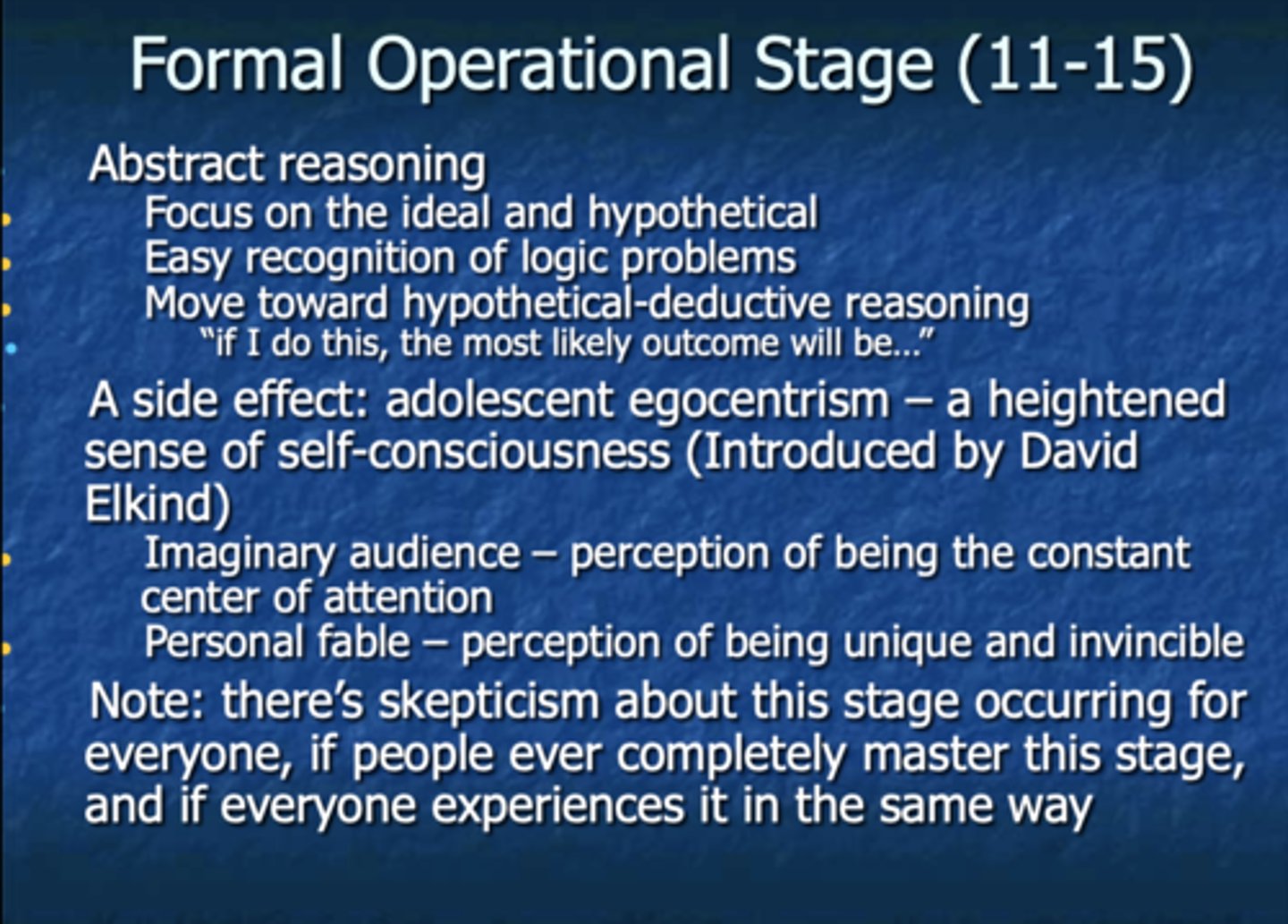
Criticisms of Piaget
- Inaccurate age of stage relation issues. (Early Conservation or Object Permanence) (Late Abstract Thinking)
- Culture impacts stages (training and exposure related)
